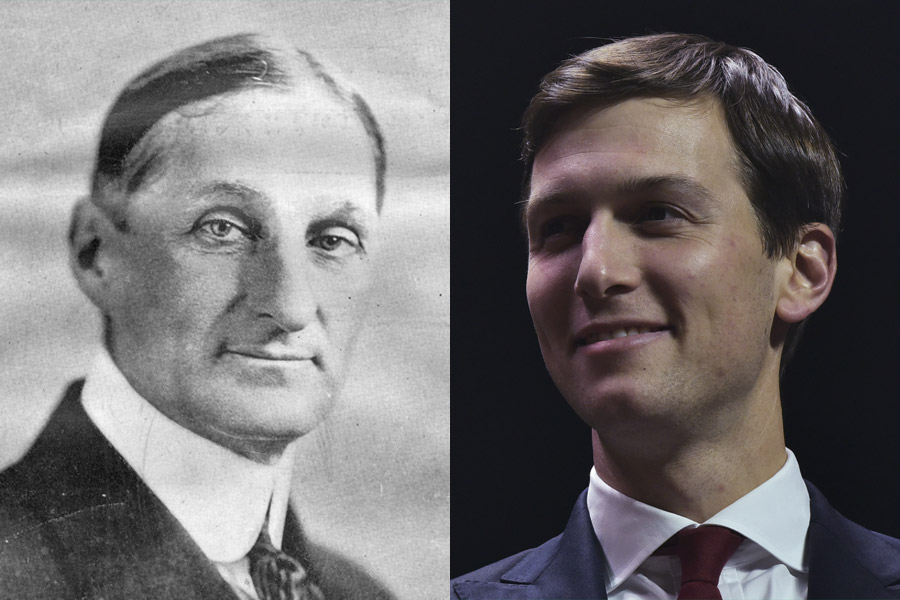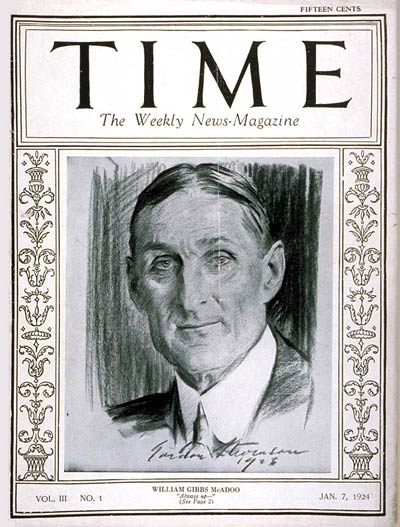
With the news this week that U.S. President-elect Donald Trump has named his son-in-law Jared Kushner a senior adviser, the fellow real-estate developer is now in position to become what some have called the most powerful son-in-law of a president in U.S. history.
But, while Kushner’s power will certainly be unusual, he will not be the first presidential son-in-law to wield great influence. Case in point: William Gibbs McAdoo was a high-profile businessman before he went to work in Woodrow Wilson’s administration, where he served as Secretary of the Treasury. He also married the President’s daughter.
The differences between Kushner and McAdoo are many. For one thing, McAdoo’s time as a White House son-in-law predates the federal anti-nepotism statute known as the “Bobby Kennedy law,” which prohibits federal officials from appointing relatives to certain jobs. (Kushner will get around the law by not taking a salary.) For another, McAdoo became Wilson’s son-in-law after he was already a cabinet secretary. Nevertheless, his story shines a light on some of the perks and pitfalls of family matters in the executive office.
Also unlike Kushner, who comes from a well-known New York family, McAdoo was a self-made man, according to Douglas Craig, author of Progressives at War: William G. McAdoo and Newton D. Baker, 1863-1941 and historian at Australian National University. He was born around Marietta, Ga., on Halloween of 1863, in the middle of the Civil War. At the end of the war, McAdoo’s plantation-owner father, who had lost his fortune, moved the family to Knoxville, where he became a professor at the University of Tennessee. McAdoo attended the school, then moved to practice law in Chattanooga and married a native of the city, Sarah Houstoun Fleming. But, even as he worked as a lawyer, he was fascinated by something else: railroads, the bright new technology of the day. He ended up buying the Knoxville Street Railway Company, which produced one of the first electrified streetcar lines. When the business was a failure, McAdoo moved New York City where he again started by practicing law but soon switched to into the railroad business, for which he sold bonds.
Noticing that the under-river tunnels that were supposed to connect New Jersey and New York by rail were taking forever to be completed, he took over the project. The result was the Hudson and Manhattan railroad, which linked N.J. and N.Y. for the first time on Feb. 25, 1908, at a nickel per ride. The entrepreneur made his fortune off this feat. But back then, riders simply knew it as “McAdoo Tubes” or the “McAdoo Tunnel.” (Since 1962, it has been called the PATH train—Port Authority Trans-Hudson.) The New York Times called it “one of the greatest engineering feats that has ever been accomplished, greater perhaps than the Panama Canal will be when completed.”
McAdoo started giving tours to prominent political leaders and foreign dignitaries, and ended up meeting Woodrow Wilson around 1910, near the end of his tenure as the president of Princeton University. He was soon campaigning for Wilson in his successful race for Governor of New Jersey. He then co-chaired Wilson’s successful presidential campaign, as vice chairman of the Democratic National Committee, in 1912.
After helping Wilson win the White House, McAdoo became Secretary of the Treasury on March 6, 1913. His wife Sarah had died the previous year and, in his proximity to the Wilson family, he noticed Wilson’s daughter Eleanor—even though he was a father of six and more than twice her age. The 23-year-old, who went by Nell, had been secretly engaged to an engineer whom she met on vacation in Mexico, so she initially rebuffed the attempts to pursue her. But McAdoo won her over with “coded messages sent through a messenger, expressing his deep love,” according to Craig.
He proposed to her on a bench in front of the Washington Monument, and they wed in the White House Blue Room on May 7, 1914. They would go on to have two children.
That June, the assassination of the Archduke Franz Ferdinand in Sarajevo set off a series of events that triggered World War I. The coming of war meant that McAdoo’s power increased even more.
Get your history fix in one place: sign up for the weekly TIME History newsletter
First, as Europeans began to sell off their American stocks and bonds, he shut down the New York Stock Exchange on July 31, 1914, for nearly four months. “If he hadn’t done that there might have been much more panic selling,” says Richard E. Sylla, a financial historian and professor emeritus at NYU Stern School of Business. “That’s what his major accomplishment was — avoiding the potential for a much worse financial panic in 1914. The dollar weakened a lot, but thanks to McAdoo’s policies, it strengthened a lot by November.”
And, in the middle of all of these international financial tensions, he managed to start the Federal Reserve System, which he and Democratic Senator from Virginia Carter Glass helped craft with the 1913 Federal Reserve Act. According to The Home Front Encyclopedia: United States, Britain, and Canada in World Wars I and II, “Glass thought regional banks should be owned and controlled by private bankers, but McAdoo favored a public organization. Wilson agreed to a compromise; the banks would be privately owned but supervised by a publicly appointed Federal Reserve Board.”
Furthermore, as chair of the War Finance Corporation, he basically set up the policy for how to fund World War I by raising taxes and instituting gold savings bonds called “Liberty Loans,” a money-raising and propaganda tool. When German submarine attacks made transatlantic trade dangerous and expensive, he created the U.S. Shipping Board in 1916. And he served as director general of U.S. railroads when the government started controlling the railroads to make sure military supplies and personnel got transported in a timely manner. Craig adds that people thought so highly of McAdoo at the time that they equated him to Alexander Hamilton, the nation’s first Secretary of the Treasury. TIME summed up his accomplishments in 1932 by quoting a jingle: “He’s always up and McAdooing / From Sun to Star and Star to Sun / His work is never McAdone.'”
Yet there was a feeling among fellow cabinet members that the reason McAdoo was able to do so much was because he was married to the boss’s daughter.
They were “always suspicious” of McAdoo and thought he had an “inside track” to President Wilson, says Craig—who argues that, in reality, the situation was the exact opposite. His father-in-law became increasingly turned off by his son-in-law’s doggedness and they became less close over time. “Wilson thought McAdoo was too ambitious and too pushy,” says Craig.

So McAdoo was McAdone with serving as Treasury Secretary once the Allies and Germany signed an armistice to end the war on Nov. 11, 1918. The front page headline of New York Times on Nov. 23, 1918, declared that he had told Wilson he was retiring to “increase his personal income” and that he wanted a vacation—but he planned to move back and simply had his eye on higher office: the Oval Office.
As it turned out, the man who was good at getting Wilson to the White House was not good at getting himself elected. In 1920 and in 1924 he failed to gain the Democratic nomination for president—or to rally enough “McAdoodlers,” as the press called his supporters. (In 1924, when he ran against New York Governor Al Smith, he was backed by the anti-Catholic Ku Klux Klan.) He started campaigning so aggressively early on that TIME wrote in its Jan. 7, 1924, cover story, “None of the candidates wiped his feet on the doormat of New Year’s Eve, with more gusto than William G. McAdoo. Always up, always precipitating himself abruptly into issues and situations, McAdoo is letting no herbage spring up under his feet.”
Though he successfully convinced the California delegation at the 1932 Democratic National Convention to switch its vote from House Speaker John Garner to Franklin Delano Roosevelt (scheming that TIME nicknamed “McAdoodling” in a July 11, 1932, article) and was eventually elected to a California U.S. Senate seat, his failure to win the White House left him disillusioned—and ruined his marriage.
His obsessiveness and the way he spent many days in Washington while Nell lived in California drove her into a state of “constant nervous turmoil,” worried that he would suffer a disabling stroke the way her father did in 1919, according to Joshua Kendall’s First Dads: Parenting and Politics from George Washington to Barack Obama. In a letter to her sister Margaret, Nell described him as destined to be “a disappointed man, having lost his long fight for the presidency.” She asked for a divorce in 1934. By then, TIME reported that McAdoo was “rated as the Senate’s foremost frequenter of night clubs.” After the divorce, the 71-year-old McAdoo wooed 26-year-old “reserved and pious” government nurse Doris Cross and married her a year later. (“Said Senator McAdoo‘s new father-in-law, 16 years his junior, in Oakland, Iowa: ‘I don’t care if he is a Senator and a Democratic leader, I still don’t like the idea of a girl her age marrying a man his age.'”)
Ironically, though he was skilled financial manager when it came to managing the portfolio of a country that represented about 100 million people, he wasn’t good at managing his own portfolio.
“He made and lost quite a lot of money,” says Craig. “He was involved in the oil industry and oil speculation. He was always too ambitious and putting money into propositions that didn’t work out, and never stuck to anything.” On top of that, his children relied on him for financial support, as most of them got caught up in substance abuse issues, according to Craig. When McAdoo died on Feb. 1, 1941, at 77 years old, he was not as well-off as he could have been. The man whom TIME described in his obituary as “lean, grey wheel horse of the Democratic Party, politically swaybacked, politically a pensioner” died of a heart attack shortly after attending FDR’s third inauguration.
More Must-Reads from TIME
- Donald Trump Is TIME's 2024 Person of the Year
- Why We Chose Trump as Person of the Year
- Is Intermittent Fasting Good or Bad for You?
- The 100 Must-Read Books of 2024
- The 20 Best Christmas TV Episodes
- Column: If Optimism Feels Ridiculous Now, Try Hope
- The Future of Climate Action Is Trade Policy
- Merle Bombardieri Is Helping People Make the Baby Decision
Write to Olivia B. Waxman at olivia.waxman@time.com